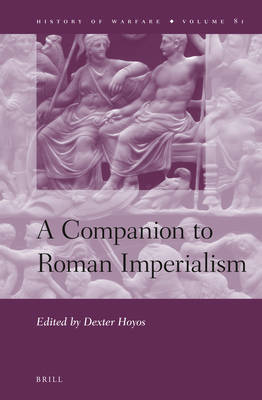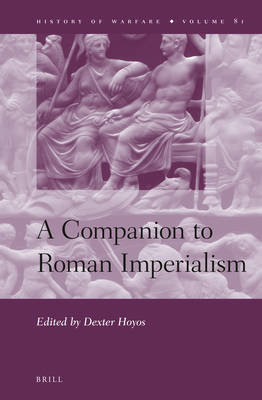
- Afhalen na 1 uur in een winkel met voorraad
- Gratis thuislevering in België vanaf € 30
- Ruim aanbod met 7 miljoen producten
- Afhalen na 1 uur in een winkel met voorraad
- Gratis thuislevering in België vanaf € 30
- Ruim aanbod met 7 miljoen producten
Zoeken
A Companion to Roman Imperialism
€ 331,45
+ 662 punten
Omschrijving
The Roman empire extended over three continents, and all its lands came to share a common culture, bequeathing a legacy vigorous even today. A Companion to Roman Imperialism, written by a distinguished body of scholars, explores the extraordinary phenomenon of Rome's rise to empire to reveal the impact which this had on her subject peoples and on the Romans themselves. The Companion analyses how Rome's internal affairs and international relations reacted on each other, sometimes with violent results, why some lands were annexed but others ignored or given up, and the ways in which Rome's population and power élite evolved as former subjects, east and west, themselves became Romans and made their powerful contributions to Roman history and culture.
Contributors are Eric Adler, Richard Alston, Lea Beness, Paul Burton, Brian Campbell, Arthur Eckstein, Peter Edwell, Tom Hillard, Richard Hingley, Benjamin Isaac, José Luis López Castro, J. Majbom Madsen, Susan Mattern, Sophie Mills, David Potter, Jonathan Prag, Steven Rutledge, Maurice Sartre, John Serrati, Tom Stevenson, Martin Stone, and James Thorne.
Contributors are Eric Adler, Richard Alston, Lea Beness, Paul Burton, Brian Campbell, Arthur Eckstein, Peter Edwell, Tom Hillard, Richard Hingley, Benjamin Isaac, José Luis López Castro, J. Majbom Madsen, Susan Mattern, Sophie Mills, David Potter, Jonathan Prag, Steven Rutledge, Maurice Sartre, John Serrati, Tom Stevenson, Martin Stone, and James Thorne.
Specificaties
Betrokkenen
- Uitgeverij:
Inhoud
- Aantal bladzijden:
- 416
- Taal:
- Engels
- Reeks:
- Reeksnummer:
- nr. 81
Eigenschappen
- Productcode (EAN):
- 9789004235939
- Verschijningsdatum:
- 9/11/2012
- Uitvoering:
- Hardcover
- Formaat:
- Genaaid
- Afmetingen:
- 163 mm x 239 mm
- Gewicht:
- 816 g

Alleen bij Standaard Boekhandel
+ 662 punten op je klantenkaart van Standaard Boekhandel
Beoordelingen
We publiceren alleen reviews die voldoen aan de voorwaarden voor reviews. Bekijk onze voorwaarden voor reviews.







